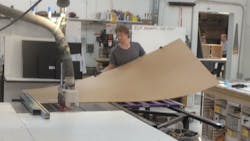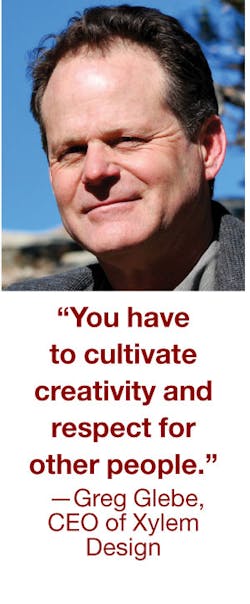Leadership and Strategy: To Go Lean, You First Must Lead
Starting out on the lean journey can be tricky. What it takes is a leadership team fully committed to the lean transformation and willing to take the lead.
For CEO Greg Glebe, a new convert to lean, that means grabbing a toilet brush and Lysol.
"The bathroom is where it starts," Glebe says.
Glebe, founder of Xylem Design, a Fort Collins, Colo.-based manufacturer of pedestals for art, museums and trade shows, took advice from lean advocate Paul Akers, author of "2 Second Lean" and founder and owner of FastCap LLC, a Bellingham, Wash.-based product development company.
See Also: Lean Manufacturing Leadership Best Practices
Akers, who promotes making "two-second improvements" -- simple, fast process improvements -- suggests creating a culture ripe for lean implementation by first transforming the company's bathroom to lean standards.
By setting cleaning standards in the bathroom -- a room used by all employees -- the workforce sees firsthand what lean in action looks like and has a launch pad from which it can begin implementing lean in more traditional work spaces.
At the Core, Respect
"There are strong visual controls for everything," Glebe says. "You keep it immaculate. And everybody cleans that bathroom. I clean it."
The shared responsibility of cleaning the bathroom works to eliminate the hierarchy present in business, in effect equalizing employees. And that's a necessary component of empowering workers, Glebe says.
"The idea at the very foundation of it is you have to cultivate creativity and respect for other people," he says.
From that point, the tough challenge of becoming lean is made simpler. Employees feel empowered to suggest better ways to do things and to fix the problems they deal with every day.
Glebe's approach to engaging workers is to encourage them to create 30-second videos showcasing the changes they've made. The videos are then uploaded to the company's YouTube channel and reviewed during the Lean Lunch -- a daily hour-long meeting of all employees.
The Lean Lunches are intended to be upbeat rallying cries of sorts for the workers to see and share the progress being made, and feel like a crucial component of that process. Glebe often shows videos from pleased customers and encourages open discussion amongst the team.
A key objective at Xylem Design is to create a culture where people aren't afraid to talk about mistakes.
"We talk about mistakes every day at lunch," Glebe says. "You can take that fear and replace it with true empowerment," by accepting mistakes as opportunities for change rather than as a need for discipline.
Already, the process is showing results. Xylem has 80 videos on its YouTube channel, most of which are instructional two-second improvements employees have made.
A Challenge to Conquer
Chris Riemer, who has worked at Xylem for seven years, says the videos are like a game, a challenge he wants to conquer.
"It's about finding a simple thing that'll make it easier for you to do your job. You take pride in that," Riemer says.
For example, the company's ordering process used to be long and cumbersome. The staff put together a value stream map and decided to eliminate the middle man -- in this case the general manager -- from the process, instead delivering orders directly to the production manager. They also removed the plastic sleeves in which orders were previously placed, cutting the redundant action of inserting orders into sleeves.
"In a manufacturing environment, there are zillions of things that bug you and there are zillions of things that you can improve," Glebe says.
But it takes an open-minded leader to create a holistic culture of equality that will encourage and motivate employees to improve the process.
About the Author
Ginger Christ
Ginger Christ, Associate Editor
Ginger Christ is a former associate editor for EHS Today, a Penton publication.
She has covered business news for the past seven years, working at daily and weekly newspapers and magazines in Ohio, including the Dayton Business Journal and Crain's Cleveland Business.
Most recently, she covered transportation and leadership for IndustryWeek, a sister publication to EHS Today.
She holds a bachelor of arts in English and in Film Studies from the University of Pittsburgh.

